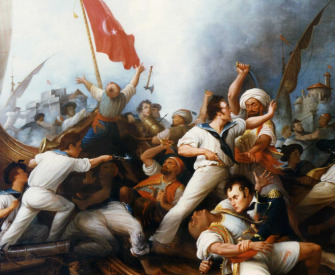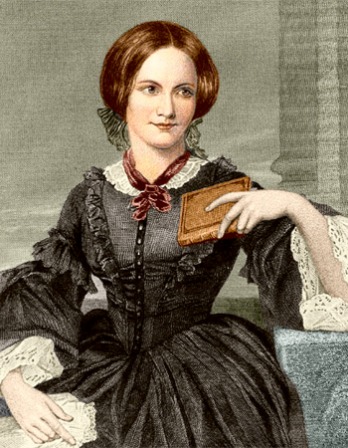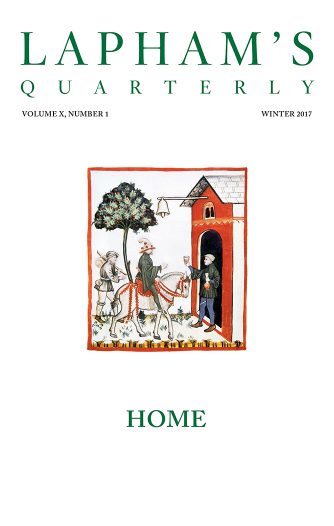The first object which saluted my eyes when I arrived on the coast was the sea—and a slave ship, which was then riding at anchor and waiting for its cargo. These filled me with astonishment, which was soon converted into terror, which I am yet at a loss to describe, nor the then feelings of my mind. When I was carried onboard, I was immediately handled and tossed up, to see if I were sound, by some of the crew; and I was now persuaded that I had gotten into a world of bad spirits, and that they were going to kill me. Their complexions, too, differing so much from ours, their long hair, and the language they spoke, which was very different from any I had ever heard, united to confirm me in this belief. Indeed, such were the horrors of my views and fears at the moment that, if ten thousand worlds had been my own, I would have freely parted with them all to have exchanged my condition with that of the meanest slave in my own country. When I looked round the ship too and saw a large furnace of copper boiling and a multitude of black people of every description chained together, every one of their countenances expressing dejection and sorrow, I no longer doubted of my fate, and, quite overpowered with horror and anguish, I fell motionless on the deck and fainted. When I recovered a little, I found some black people about me, who I believed were some of those who brought me onboard, and had been receiving their pay; they talked to me in order to cheer me, but all in vain. I asked them if we were not to be eaten by those white men with horrible looks, red faces, and long hair? They told me I was not, and one of the crew brought me a small portion of spirituous liquor in a wine glass, but being afraid of him, I would not take it out of his hand. One of the blacks therefore took it from him and gave it to me, and I took a little down my palate, which, instead of reviving me, as they thought it would, threw me into the greatest consternation at the strange feeling it produced, having never tasted any such liquor before.
In a little time after, among the poor chained men, I found some of my own nation, which in a small degree gave ease to my mind. I inquired of these what was to be done with us? They gave me to understand we were to be carried to these white people’s country to work for them. I then was a little revived and thought, if it were no worse than working, my situation was not so desperate, but still I feared I should be put to death, the white people looked and acted, as I thought, in so savage a manner. For I had never seen among any people such instances of brutal cruelty, and this not only shown toward us blacks but also to some of the whites themselves. One white man in particular I saw, when we were permitted to be on deck, flogged so unmercifully with a large rope near the foremast, that he died in consequence of it, and they tossed him over the side as they would have done a brute. This made me fear these people the more, and I expected nothing less than to be treated in the same manner. I could not help expressing my fears and apprehensions to some of my countrymen; I asked them if these people had no country but lived in this hollow place, the ship? They told me they did not, but came from a distant one. “Then,” said I, “how comes it in all our country we never heard of them?” They told me, because they lived so very far off. I then asked where were their women? Had they any like themselves! I was told they had. “And why,” said I, “do we not see them?” They answered, because they were left behind. I asked how the vessel could go? They told me they could not tell, but that there were cloths put upon the masts by the help of the ropes I saw, and then the vessel went on, and the white men had some spell or magic they put in the water when they liked in order to stop the vessel. I was exceedingly amazed at this account and really thought they were spirits. I therefore wished much to be from among them, for I expected they would sacrifice me. But my wishes were vain, for we were so quartered that it was impossible for any of us to make our escape. While we stayed on the coast I was mostly on deck, and one day, to my great astonishment, I saw one of these vessels coming in with the sails up. As soon as the whites saw it, they gave a great shout, at which we were amazed, and the more so as the vessel appeared larger by approaching nearer. At last she came to an anchor in my sight, and when the anchor was let go, I and my countrymen who saw it were lost in astonishment to observe the vessel stop—and were now convinced it was done by magic. Soon after this, the other ship got her boats out, and they came onboard of us, and the people of both ships seemed very glad to see each other. Several of the strangers also shook hands with us black people and made motions with their hands, signifying, I suppose, we were to go to their country, but we did not understand them. At last, when the ship we were in had got in all her cargo, they made ready with many fearful noises, and we were all put under deck, so that we could not see how they managed the vessel. But this disappointment was the least of my sorrow.
From his Interesting Narrative. Born in 1745 in what is now Nigeria, Equiano was kidnapped at the age of eleven and eventually brought to Virginia via Barbados. Among his masters during ten-odd years of slavery were a plantation owner, a lieutenant of the British navy, and a Philadelphia-based Quaker merchant. Considered the originator of the slave narrative, Equiano bought his freedom in 1766, settled in London, became an abolitionist, published his book in 1789, married in 1792, and died in 1797.
Back to Issue





